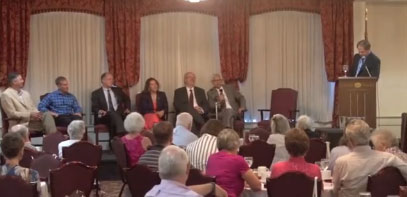
I was recently invited to participate in a panel on Civility for the National Endowment on the Humanities and the Vermont Bar Association, and it made me think of the challenges we see in rural towns in a different light.
When the Vermont Council on Rural Development led our “Community Visit” process to one small town in 2005, a 14 year old boy addressed the town meeting describing how the seating arrangement for lunch in the cafeteria showed the division of “hippy kids,” “rednecks,” “those who’d only been in town for a few years,” the wealthy, and the popular. He concluded with, “I don’t talk to you, because my dad doesn’t talk to your dad,” and “it is time we act as one community.”
In another process we managed a few years later, folks described disconnected “Communities within the Community,” including the college community, downtown association, American Legion, parents’ group, arts crowd, Chamber of Commerce, mobile home tenants’ association, municipal government, service clubs and churches. In many towns groups like these act as disconnected circles with their own events and their own invitations, and no one else thinks the event is for them.
This disconnection within communities can, ironically, be furthered in the Internet age where vertical “communities of interest” ranging from PETA to the NRA replace more horizontal communities of local place. On the Internet, we can connect to an inner circle of “kindred spirits” who believe the same things we do, and who mutually reinforce negatives about those who differ from us, often by citing the most egregious or ignorant of opponents. Then we can feel righteous and entitled. Not everyone turns into an Internet “flamer,” but the potential incivility of online discourse needs to be countered by real and local connection. This happens both face to face as well as in local online communities like Front Porch Forum, a Vermont neighborhood model of judiciously moderated civil dialogue that lets folks find lost dogs, question municipal government, debate school issues, and sell used tires, all the while virtually bumping elbows with their neighbors, even those for whom they have less affinity.
It may sound prosaic, but mutual invitation to dialogue and fun events is just a plain necessity, and we need to build this through dynamic community calendars like the integrative calendars being developed for VCRD’s Digital Economy Project by Front Porch Forum today.
The Council on the Future of Vermont process that VCRD managed warned that the rich are getting richer and the poor poorer in this country and that this can physically and culturally segregate us nationally as well as here in rural Vermont.
More and more civility must be based by systematic and intentional invitation.
One of the most far-reaching conclusions of the Council on the Future of Vermont Report was on Promoting Community:
Vermonters are dedicated to community but worry that trends toward the social, economic, and cultural separation of community members threaten to undermine that community in future. Vermonters don’t like the idea of ‘two Vermonts,’ of divisions between rich and poor, of gated communities and low-income enclaves. Vermonters want community that is not divided by differences: racial, ethnic, economic, or social. We need to invite participation across social and demographic differences to keep community strong for the future. We need to rededicate ourselves to the Vermont ideal of community.”
The civil society we so value in our Vermont communities can’t be taken for granted. Like democracy itself, it’s a process, not an end; one where we vote with our feet, with our organizations, with our courage to take initiative, with our neighborliness – and with our common invitations.
It’s a commitment, and civility is its catalytic culture—one that we must feed by our own politeness, kindness, and openness, every day.
